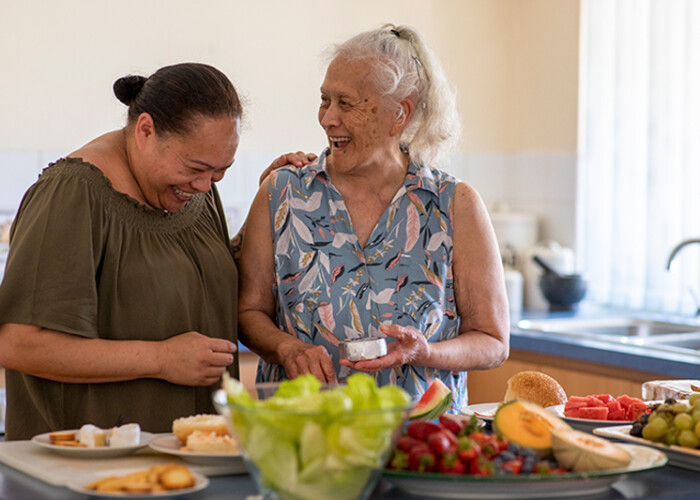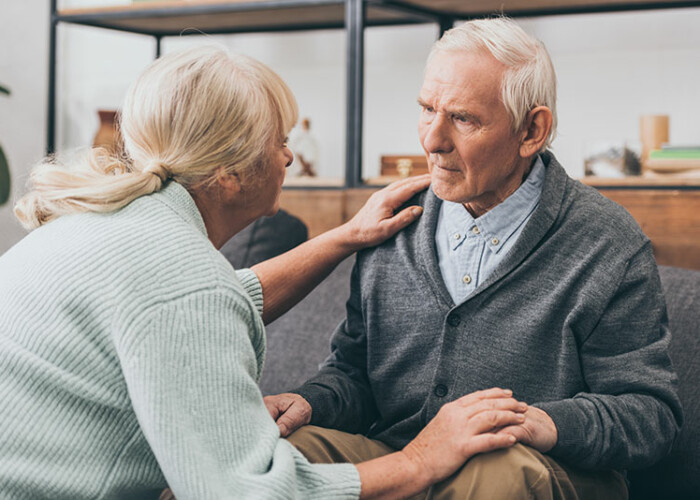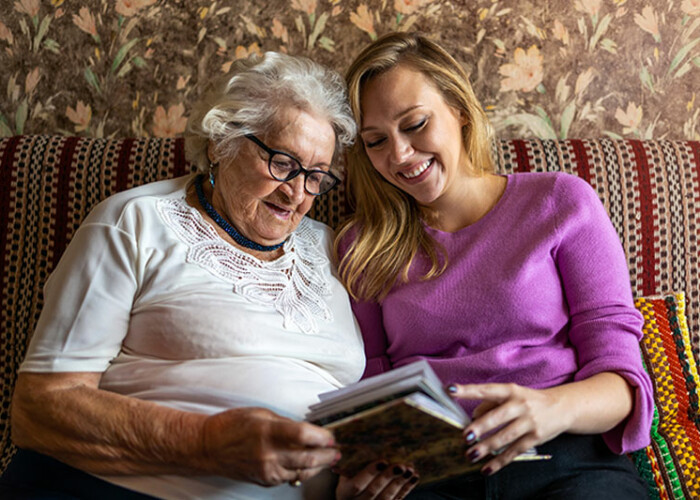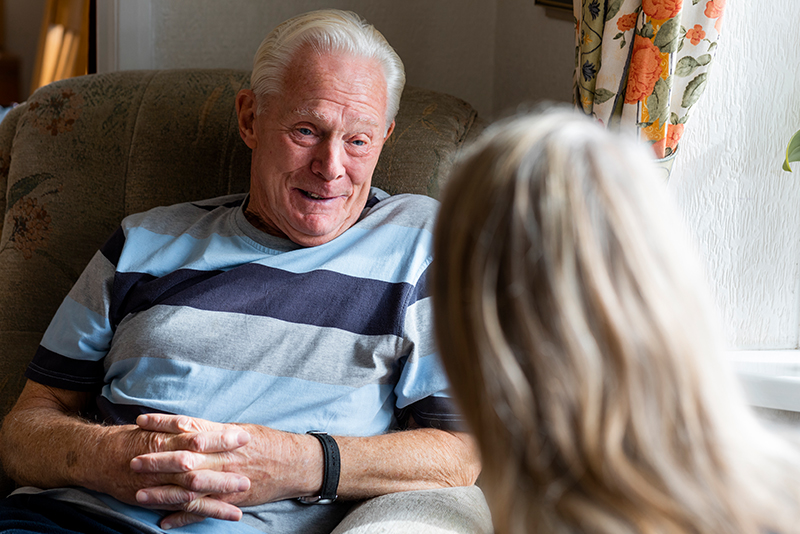Dementia
Get Cooking With These Creative Dementia Care Activities
If there’s one thing that connects us all, it’s food! Think about how many cherished memories have been made through the years that included food at the center of them all: holiday meals, birthday parties, wedding celebrations. Even ordinary days include routines that become ingrained in us around food, from that first aromatic cup of coffee in the morning to a shared bowl of buttery popcorn with family while watching a show on television.
It really is no surprise that food is not just a necessity for our physical health, but often a powerful way to connect with someone with dementia. Here are several creative dementia care activities you can try to help spark memories while engaging all the senses through food.
Storytelling. Pull out an old cookbook and look through the recipes together to determine if any spark memories. … Read More »
What to Do When a Parent Refuses Care
When a parent refuses care, these tips can help you come to a resolution.
Let’s say you’re starting to notice some warning signs that cause you to worry about Dad’s ability to continue to take care of himself. Perhaps he’s struggling to maintain the home the way he always has. Or maybe he had a close call while driving that could have caused injury to himself or another person. Maybe he just seems more disoriented lately. Whatever the reason, you’ve decided to talk with him about home care services. The problem is, he refuses to even entertain the idea. What are you to do when a parent refuses care that they desperately need?
If you’re at an impasse on how to proceed, these ideas can be helpful.
Let him know you’re in this together. Digging in your heels and … Read More »
The Health Concerns That Could Be Causing Chronic Negativity in an Older Loved One
If you’re noticing chronic negativity in an older loved one, there may be a medical condition to blame.
We all have good days and bad days, and we are all entitled to a bit of crankiness or negative thinking every now and then. If you are noticing a pattern of chronic negativity in an older loved one, however, it is worthwhile to explore whether a health problem might be the culprit.
Listed below are several reasons for persistent negativity, and how you can help.
Pain. A recent study revealed that participants who were enduring chronic pain reported a rise in negative moods, including fatigue, anger, tension, depression, anxiety, and more. It is essential to discuss any of these mood changes with the physician, as these kinds of mood changes actually impact the effectiveness of pain management treatments.
Urinary tract infections. … Read More »
Improve Memory With These Simple Strategies
Help improve memory for someone you love with dementia with these proven tactics.
Remember memorizing the order of the colors of the rainbow in elementary school? A lot of us were introduced to Roy G. Biv to learn this feat – one of the many mnemonics we learn that, interestingly, often stay with us for a lifetime and help us improve memory.
As we get older, some degree of memory impairment is to be anticipated; and naturally it is even more pronounced when Alzheimer’s disease or another form of dementia is a factor. Researchers are continually aiming to find effective methods to enhance memory and cognitive functioning, and have discovered some interesting findings on “old school” strategies such as mnemonics. Here’s what they have most recently identified:
Mnemonics
Mnemonics provides a link to a memory through a song, … Read More »
Do You Know When and How to Downsize for Seniors with Dementia?
Seniors with dementia can benefit from downsizing.
It’s clear that the family home is just too overwhelming for Mom and Dad to care for. A small home is for sale just around the corner from you that’s ideal: a beautiful flower garden in the front yard, a sunny, cheerful kitchen, and no stairs to navigate. Now it is time to begin the downsizing process. The only problem? Mom has dementia.
Any level of change can be very challenging for a senior with dementia. Leaving the familiarity of home and moving into a brand new one can enhance feelings of anxiety and agitation, but there are strategies to ease the transition.
Take your time. It can be your natural thought to make this process as quick as possible – like ripping off a band-aid. However, a much better approach in … Read More »
What People With Alzheimer’s Want You to Know
Improve communication with someone you love by learning what people with Alzheimer’s want you to know.
If you’ve ever wished you could look a senior with dementia in the eye and understand exactly what they’re thinking, we just might be able to help you with that! Communicating effectively with someone with dementia isn’t easy, especially as the disease progresses. Following are several statements provided by people with Alzheimer’s to give you some insight into what it feels like to live with the disease.
You haven’t lost me. A diagnosis of dementia does impact a person in many ways, but it doesn’t change the essence of who they are. “I love the same people and doing the same things I did before my diagnosis,” explains Dale Rivard. It’s essential to recognize that while memory and cognitive abilities may decline, the … Read More »
The Link Between Hearing Loss and Dementia You Need to Know About
Understanding the link between hearing loss and dementia is crucial to know the steps you can take to reduce the risk of cognitive decline.
Are you finding the need to turn the TV up louder for someone you love? Speaking more loudly? Repeating things the person missed hearing the first time? Hearing loss in older adults is not uncommon. But new scientific studies are pointing to a startling link between hearing loss and dementia.
How Hearing and Cognitive Functioning Are Linked
There are a number of hypotheses scientists are exploring to explain the connection between hearing loss and an increased risk of dementia:
The brain’s memory and thinking ability are affected when it has to work harder to strain to hear and to fill in the gaps when communication is missed.
An older brain shrinks more rapidly because of hearing … Read More »
The Final Stage of Alzheimer’s: What to Expect
Being prepared for the final stage of Alzheimer’s is key to continuing to help make life as meaningful as possible for someone you love.
The journey through Alzheimer’s disease can be compared to navigating a winding road that spans years, riddled with intermittent stops, starts, unexpected twists, and a plethora of unknowns. As the dedicated caregiver for an individual grappling with dementia, having foresight about what to expect around the next bend is paramount. This knowledge empowers you to not only be well-prepared but also to administer the most fitting and compassionate level of care in the final stage of Alzheimer’s.
Alzheimer’s, being a highly individualized experience, manifests uniquely in each person. Yet there are certain commonalities at every stage of the disease. When an individual transitions into the last stage, discernible challenges emerge, including struggles with eating … Read More »
3 Steps to Better Advocate for an Aging Parent
Trusting someone you love to the care of someone else is never easy, particularly for a senior family member. Whether at home or in a facility, you’ll have questions you need answered. You will also want to be ready to advocate for an aging parent to proactively address any potential problems and also to quickly take care of issues that do take place.
For instance, review the following common situations and how to most effectively advocate should they arise with an older adult you love:
The person has dementia. A loved one with Alzheimer’s might not be able to effectively communicate their wishes and needs. As an example, a new caregiver may not realize that Dad wears inserts in his shoes and she may put his shoes on each day without them. Dad may not know how to communicate this … Read More »
Reminiscing in Dementia: How to Spark Memories and Instill Joy
Memory loss and dementia may seem synonymous. Yet it’s crucial to understand that long-term memory frequently remains intact long into the progression of the disease. For this reason, tapping into those distant memories is a good way to help an older adult with Alzheimer’s stay engaged in current conversations by connecting to the past. Reminiscing in dementia can help older adults:
Better connect to others through sharing stories
Instill self-confidence by bringing to mind the numerous accomplishments they have made as well as the lives they’ve impacted
Minimize some of the adverse effects of Alzheimer’s, such as restlessness, wandering, agitation, and more
Reduce negative emotions and stress by shifting the focus to happier times
Reminiscing in dementia, also known as reminiscence therapy, doesn’t have to be elaborate. Begin by cracking open a photo album and simply looking at pictures together. Then let … Read More »

















